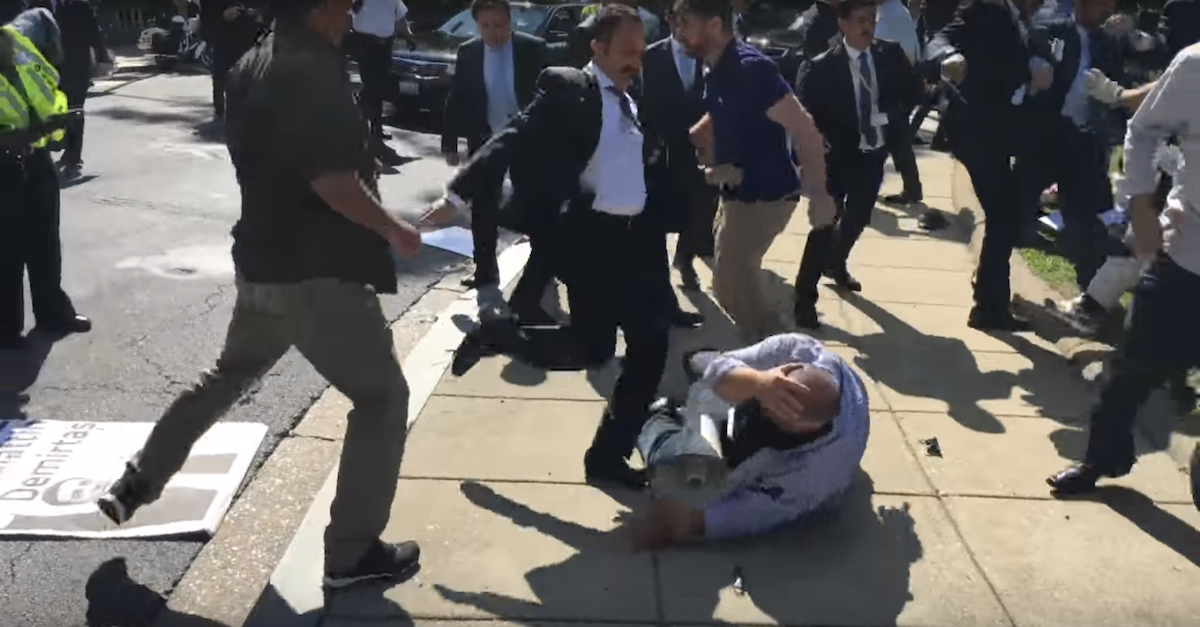
Protestors demonstrating against Turkish strongman Recep Tayyip Erdogan have sued Turkey for their assaults on the streets of Washington, D.C. in May 2017. (Screenshot via Voice of America)
More than half a decade has passed since then-President Donald Trump’s White House remained silent after Turkish leader Recep Tayyip Erdogan’s bodyguards were seen beating protesters on the streets of Washington, D.C.
Signaling a sea change for U.S.-Turkish relations since that time, President Joe Biden’s administration backed those demonstrators before the U.S. Supreme Court, arguing that agents of the Turkish government do not enjoy sovereign immunity over the alleged assaults. Two lower courts have agreed with that position.
In February 2020, U.S. District Judge Colleen Kollar-Kotelly refused to dismiss the case after Turkey invoked the Foreign Sovereign Immunities Act of 1976 (FSIA), and the D.C. Circuit affirmed her ruling in July of the following year.
U.S. Solicitor General Elizabeth B. Prelogar said that the judges got the decision right.
“The district court—having reviewed an extensive body of evidence, including videos of the altercations and declarations from security experts—determined that Turkish security personnel ‘violently’ attacked protesters with no reasonable basis for perceiving a threat to President Erdogan,” Prelogar’s friend-of-the-court brief states. “The court of appeals accepted the district court’s factual findings. […] Because the Turkish agents’ conduct as determined by the district court cannot reasonably be regarded as an exercise of the protective function, the court of appeals was correct to hold that the agents’ conduct is not protected by the discretionary-function exception.” (Citations omitted)
The solicitor general emphasized that foreign security personnel have every right to protect diplomats and senior officials from genuine threats.
“International law has long recognized the importance of protecting diplomats and senior government officials during their travels abroad,” the brief states. “The United States’ respect for that principle is as old as the Nation itself.”
But Prelogar noted that the right of foreign security personnel to use force isn’t absolute.
“Foreign states’ authority and responsibility to protect their diplomats and senior officials abroad is subject to an important limitation: foreign security personnel may use force on domestic territory only in the exercise of their protective function—that is, when the use of force reasonably appears necessary to protect against a threat of bodily harm,” the brief says. “Consistent with that limitation, the State Department’s guidance to foreign missions states that protective escorts ‘may only bring weapons into the United States for the purpose of protecting the visiting foreign government dignitary they are accompanying.'”
The solicitor general added that Turkish bodyguards used force “outside any reasonable conception of their protective function.”
“Both the Turkish agents (along with supporters of President Erdogan) and U.S. law enforcement separated the protesters from the Ambassador’s residence at which President Erdogan had arrived,” the brief states. “Yet the Turkish agents ‘crossed [the] police line’ separating them from the protesters ‘to attack the protesters’ ‘violently,’ and the district court found that they took that aggressive action without any indication ‘that an attack by the protesters was imminent,’ […] or any other reasonable basis for perceiving a threat to President Erdogan.” (Citations omitted)
The U.S. government urged the Supreme Court to reject Turkey’s petition for the justices to review the case.
Coinciding with Erdogan’s first meeting with Trump on May 16, 2017, the footage of the melee between the protesters and security personnel quickly went viral. Then only months into his presidential term, Trump faced scrutiny about his relationship with the Turkish leader, whose country then led the world in jailing journalists. Trump’s former National Security Advisor John Bolton would later describe Erdogan as one of the “dictators [Trump] likes,” in the memoir The Room Where It Happened.
Read the brief, below:
Have a tip we should know? [email protected]